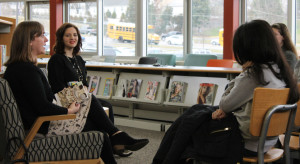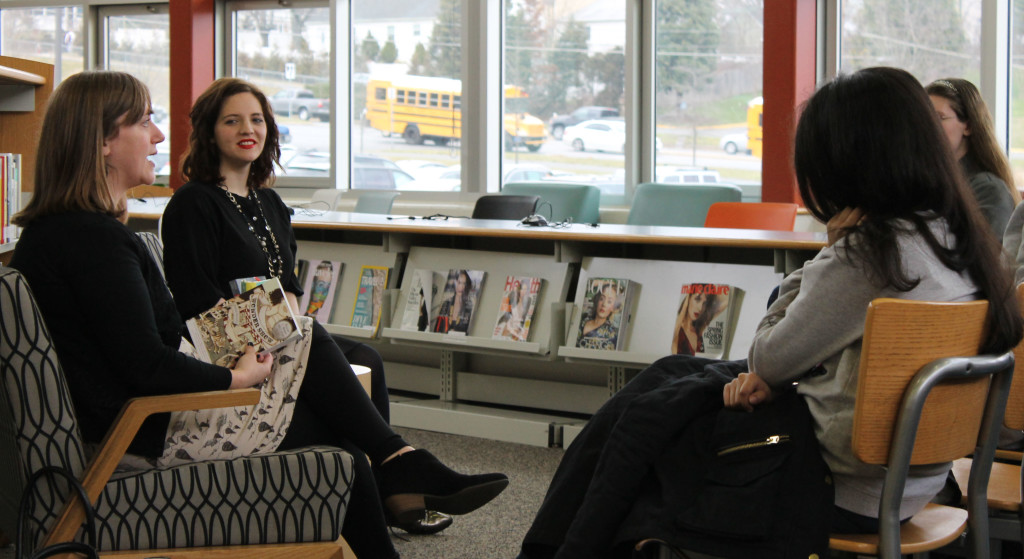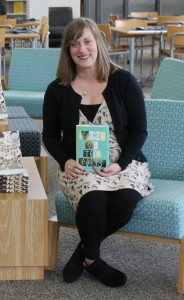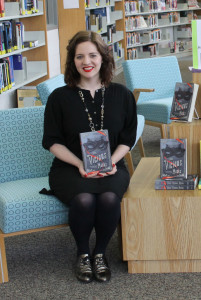
Author Hannah Barnaby and co-authors Tarun Shanker and Kelly Zekas attended the NoVa Teen Book Festival on Mar. 4 and 5 in order to promote their latest young adult novels Some of the Parts and These Vicious Masks respectively. Since their release, the novels have gained recognition for their increased emphasis on realistic character development within the central characters. During the festival, the authors spoke to attendees about their own personal experiences and hardships while writing the novels, the arduous process of success and betterment in the literary industry as well as the importance of literature in the modern world.
Some of the Parts
Author: Hannah Barnaby
Barnaby’s most recent novel, Some of the Parts, details the life of a young teenager in Boston struggling to cope with the emotional fallout caused by the death of her older brother and subsequent revelation that he was an organ donor.
Since its release, the novel has gained public recognition for its exploration of darker and more complex themes, such as loss, change and growth that may be relevant to the lives of young adult readers. The writing of the central characters has also been commended for its realistic characterization and accurate portrayal of each type of individual.
What inspired you to write Some of the Parts? Are there any aspects that are autobiographical?
There’s quite a bit that’s autobiographical. It was inspired in part by my own experience with losing a brother. My brother was younger so the circumstances in the story are very different than my own story but the emotional trajectory that the story follows is very much what I experienced. I was drawing from own feelings and reflections and memories and all of that so it is a more personal book.
How did you go about researching the various medical topics explored in the novel?
I just started by googling ‘organ recipients’ and kind of building from there. I found that state-to-state the protocols for organ recipients and donor families corresponding with each other can be very different. There are agencies in place that help make that happen.
I live in Virginia now and I just found an agency online and called the office and I ended up speaking to the director and asking him questions. It took me a while to convince him that I was a novelist and that it was just research for a book and not some secret scheme I was working on.
Is there any significance in the Bostonian setting of the book?
I used to live in Boston and that neighborhood where all the hospitals are is very familiar to me. It was the first place that I lived in, I moved to Boston to go to Simmons College for graduate school and that’s where my dorm was.
Is there any significance in the names of the characters within the novel?
Tallie is the main character and her full name is Talliesin, which is also the name of an architecture school that Frank Lloyd Wright founded in Arizona. That was a place that I had visited with my husband a few years ago when the book was starting in my mind and I was taking notes for possible plot points and character profiles. So it was a name that I had written down and I just liked the sound of it. When I name characters, it’s kind of an instinctive process. Sometimes it’s like I need a name that feels like this or that kind of sets a certain tone. I think names are very evocative of characters and of certain moods and just the tone that you want to set for that person.
How is the novel relevant to its target demographic of young adults?
To me, a book can be marketed and sold with a certain audience in mind, but good stories are pretty universal. That’s why so many teens read adult books and young adult books and it’s kind of all a mix. I think there’s certain kinds of stories that we’re drawn to as readers and as writers and those aren’t necessarily just going to fit into those categories of where a book is shelved in a store or otherwise. I think some of the best writing that’s out there right now and some of the most creative storytelling is in the young adult genre so I hope that even young people who don’t say they read a lot of young adult will stay open to it.
Which aspect of the novel are you the most proud of?
I think the fact that I took a very potentially sad story and I balanced it with some funny moments and some quirkiness in the other characters. I’m proud that it’s a story that can have an impact but also make people laugh and be an enjoyable experience and not only sad.
“I think if you want your stories to reflect life as it really is, you have to acknowledge that even in the middle of something very, very sad or difficult going on, there are also just other things, other forces acting on your life. Sometimes those forces produce really absurd, funny moments and in the midst of feeling very sad about something, you can also find something funny and that is complexity we all have.”
If you could sum up the novel in a phrase, what would it be?
“‘Being okay with changing.’ I think when we go through things that are difficult, we stiff it up, we try to steel ourselves against whatever is happening and it is damaging to do that. What I wanted people to get out of this was the idea that you’re not supposed to be the same person after something happens to you. Your experiences will change you and they should change you, that’s how it’s supposed to be.”
What inspired you to become an author?
“I did a lot of things first because I always loved reading and books and stories and it seemed very, very difficult to be an author. You can’t really go to school for it, you can’t plan for it to happen. Being an author, there’s many more possibilities for failure and it not working out. First I went to school to study children’s literature because I thought maybe I would be a teacher and then I got a job as an editor and I worked in bookstores. I kind of worked all around being an author first and it took a long time for me to sort of take that leap and say ‘this is what I want to do.’ But I’m glad that it worked that way because I think by the time I sat down to write a book, I had read so many books that I had a really clear sense of what I wanted to say and how I wanted to say it.”
Why are events like the NoVa Teen Book Festival important?
“I think it’s important for people of all ages, but especially young people, to have access to authors and to see that they are also regular people who do this kind of work because it makes it all seem possible. Everybody has stories in them that want to be told. So it reduces the mystique of authors and it’s just inspiring, even though I’m an author too, I love going to festivals like this because hearing other writers talk about their work is really energizing. Everybody has a different process and a different approach and it’s just really cool to hear about that.”
What role should reading and books play in a young adult’s life? Why are they important?
“I think they’re mostly important because they can decrease your sense of isolation. I think that what you can get out of a story is comfort and a feeling of not being alone in how you feel about something or a question you’ve always wondered about. It’s like they’re articulating your thoughts as well as their own and that makes you feel connected to them. I think that we as a whole feel increasingly disconnected from each other and I hope that books can bring us back together.”
These Vicious Masks
Author: Kelly Zekas
The first novel for both Zekas and her co-author Tarun Shanker, These Vicious Masks, follows the life of Evelyn Ralston, who lives the life of a typical 19th century girl until her beloved older sister Rose mysteriously vanishes. She soon discovers on her quest to find Rose that both her sister and she have magical healing powers.
Since its release, the novel has received high ratings from multiple sources for its creative use of the historical fiction and fantasy genres and realistic dialogue. The duo plan for the book to be the first entry in a trilogy of novels.
What was the writing process like?
It’s actually co-written. I have a co-author, we met in college and it took us seven years to write. We were just kind of learning how to write a novel and it was a lot of “oh let’s rewrite the entire first part of the book” and it basically kept starting later and later in the story. It was a lot of fun. It takes longer with co-writing because we both have to be happy with every chapter, every paragraph, every word by the final draft. And then most people quary and they send out letters to agents and hope to get a book agent but we actually were doing that for a while but then we found out a new publishing imprint called Swoon Reads. They’re our imprint and they accept any young adult romance novel, so you can just upload it. It’s really cool actually. You can go on and read and rate and comment, and then they pick a few every few months and they picked ours up. It took a long time and it’s a very different book than it was in the beginning but we’re pretty thrilled with it.
What are the challenges that come along with being a co-author?
If I want to go in one direction and he wants to go in another we have to find a compromise or we have to try and convince the other person that we’re right. Co-writing is definitely different for every set of people who do it but for us we were really blunt with each other so we can say “no I don’t want that, I don’t like it” without the other person thinking that we feel that everything they do is terrible. There’s a lot of compromise that goes into it. It’s actually kind of great though because when you’re trying to convince the other person of why you want to do something, you really start flushing it out yourself, so I think by the time we finish something, we’re very sure of where we want it to go.
Do you think you can relate to any of the characters?
Yes. Well, I would like to say that I had a superpower, but sadly, I don’t. That would be awesome. I would love to teleport. I think Evelyn is basically a better version of me. She’s super sassy. She’s very snarky and she sometimes can be kind of rude and wrong but I think she’s a little bit of a wish of what I want to be. I wish I was a little upfront at times, but I think there’s definitely a little bit of me in her and there’s a little bit of my co-author Tarun in her as well. Laura is basically this little sister figure, and she is super romantic and basically loves everything and I think in the end I’m a total sap. I think there’s a little bit of me in all of the characters.
Do you think Evelyn’s characteristics are accurate for the time period?
I don’t think the average, everyday person was like Evelyn but there was this group of women in 1881 who started this reform dress society and there were already women advocating for their right to vote. There were already women who just as strong and as fighting as we think of them today. Yes, she’s certainly not your average 19th century girl, but she definitely fits her time. A lot of our favorite heroines are the one’s who want a measure of independence, and sometimes that means marriage. In a lot of ways, that was the way to get freedom in that time. I’m sure our modernism sneaks in a little bit. I’m a modern girl and he’s a modern guy so I’m sure that makes it’s way in there. I think she’s of the times as well.
What inspired you to write this novel?
I love YA and I love anything historical. My co-author loves comic books. We started reading the things that the other person is interested in and he said he was wanting to write a Young Adult novel and we thought about kind of combining our two favorite things of comic book superheros and this historical time period. Wouldn’t it be interesting to see if superpowers developed in that time period?
Was it more of a spontaneous thought or was it more of a longer process?
It was kind of like “I want to write this” and I said “okay, let’s brainstorm and let’s figure out what we’re going to do.” At first I was going to be more of an editor and heavily invested reader but then we were starting to go through it and I was writing more and more. It became more of a mix of the two things we liked as we went along.
Do you see yourself writing more books in the future? By yourself or with your co-author?
It’s actually the first in the trilogy so we will finish the rest and then after that we have ideas to both work as a team and to work on our own. I think we’ll continue to read each other’s stuff though.
How did you guys meet?
We met in our freshman year writing class in college. Just sat next to each other and started talking and became friends. We went to NYU and I was actually there for acting and he was there for film so both forms of storytelling but it took us a while to get to the writing part. I wouldn’t even say I decided to become an author it was more like “oh, let’s do this!” Tarun was still writing films and I was still acting in plays in New York but thankfully this is what worked out.
Why do you think the NoVA Teen Book Festival and reading are important?
This is actually my first real event. I had a book launch and then this will be the first real book event I do. Being able to be around other people to discuss book writing and characters and what’s going on the world of YA today is really exciting to me. It’s really cool how teens can get involved in this and hear what’s going on behind the books. Everything about reading is so important. How can you not want to read? You can learn about all these different worlds and all of these different points of views and experiences that are out there. It’s important for understanding other people. It makes other people better.
Would you say your acting experience led you to your author experience?
I think so. It’s a form of storytelling and instead of just creating the characters and bringing those to life, writing is bringing the story to life My favorite part of writing is characters and dialogue and my co-author is amazing at plotting. Of course, we both love each part but we all have favorites. I love figuring out who these people are and what in their lives led them to being who they are. It’s very similar to acting in that way.
When you were writing These Vicious Masks, did you mostly come up with the characters and did your co-author come up with most of the plot?
Our main character actually had a completely different personality. Evelyn was this sweet and bittable person and then when we were writing we realized that she wasn’t that type of person at all and everything changed. The plot fits the characters and the characters fit the plot. I had some very strong ideas on the characters and the romance involved but I think the plot was a mix of both of us. There’s no part of this book that’s just one of us. We have to start somewhere so we’ll sketch out a couple chapters each and then trade them but we’ll write over them and then send it back and the person writes over that again. We actually argue over who wrote what line. It’s probably going to be that we each wrote half of it! It’s so integrated which isn’t how all co-authors work. Some go back and forth.
Do you think you would prefer writing by yourself or as a co-author?
Currently, the idea of writing by myself is terrifying but co-writing is like having another brain there that actually responds to you and helps you create better ideas. There’s a give and a take. I love co-writing because there’s a second set of ideas, and when you’re tired they can pick up the slack and vice versa. There’s pluses and minuses but at this point I would be lost in my world and would need help getting through it. I love co-writing.



